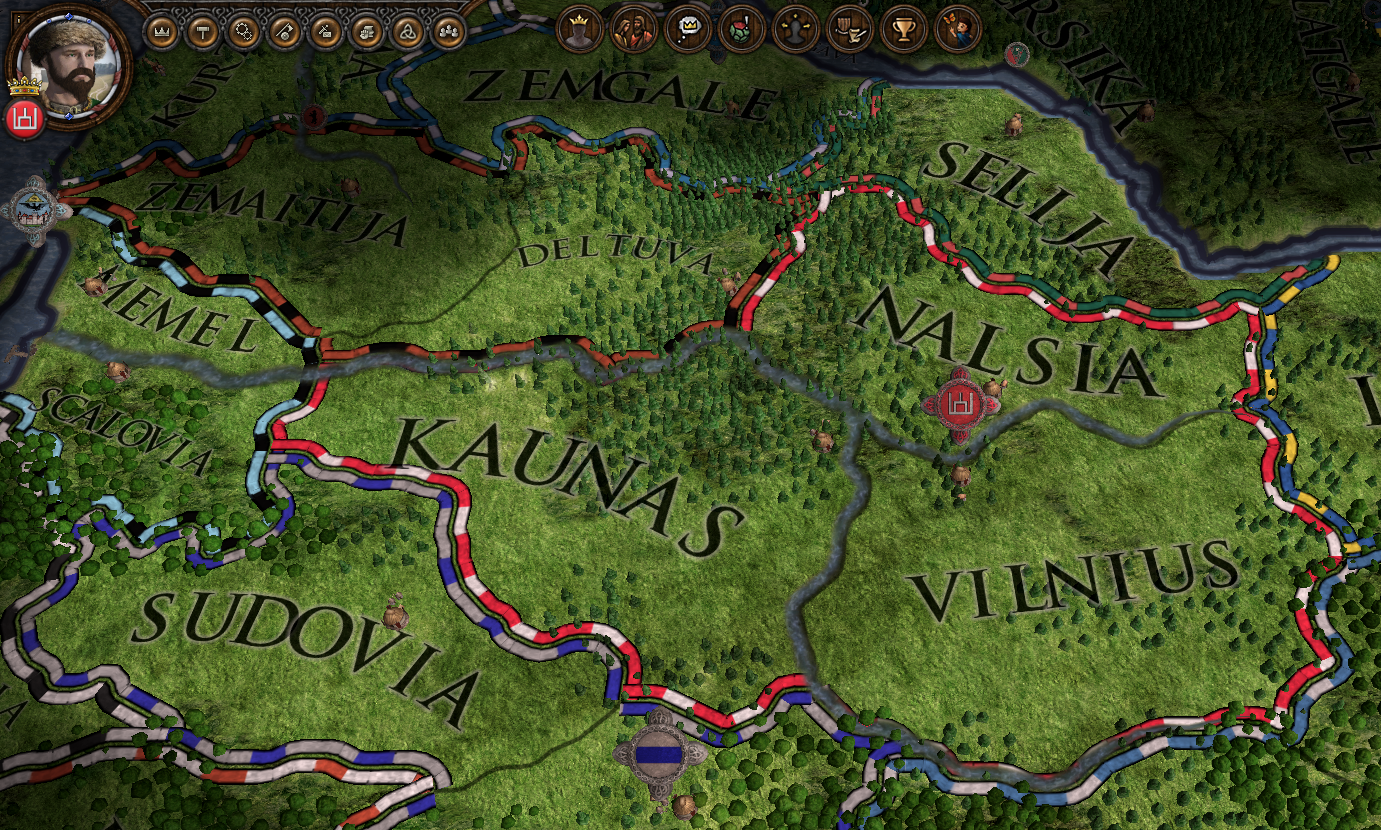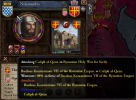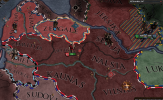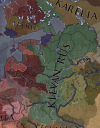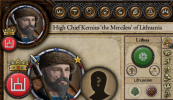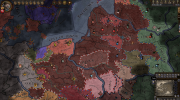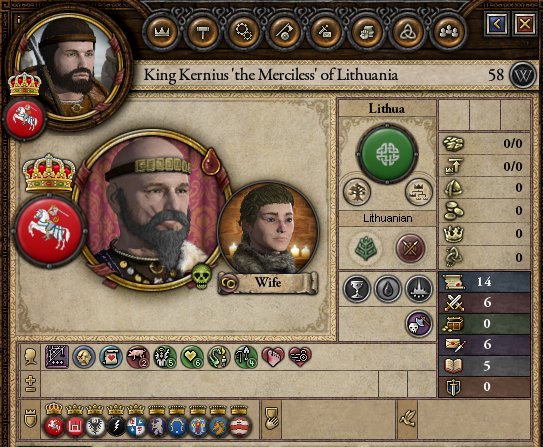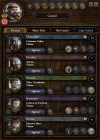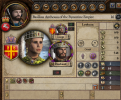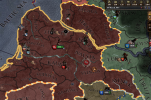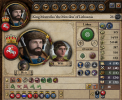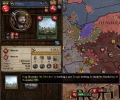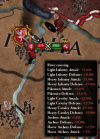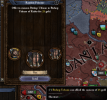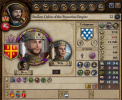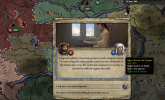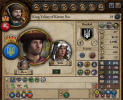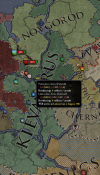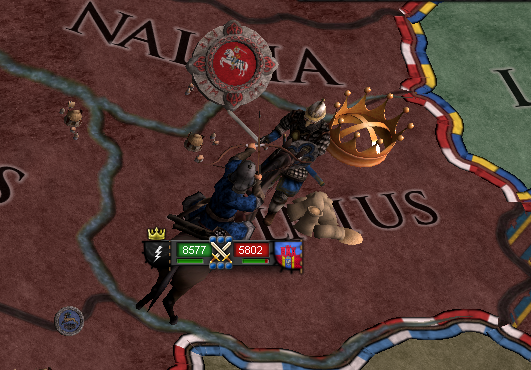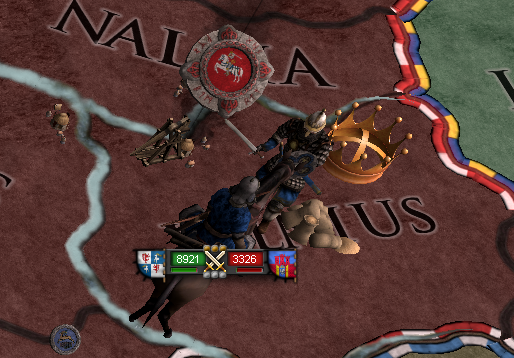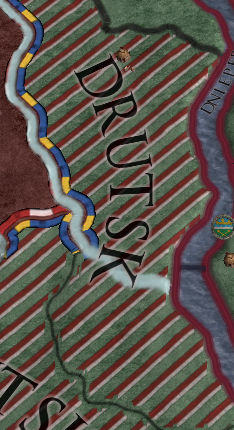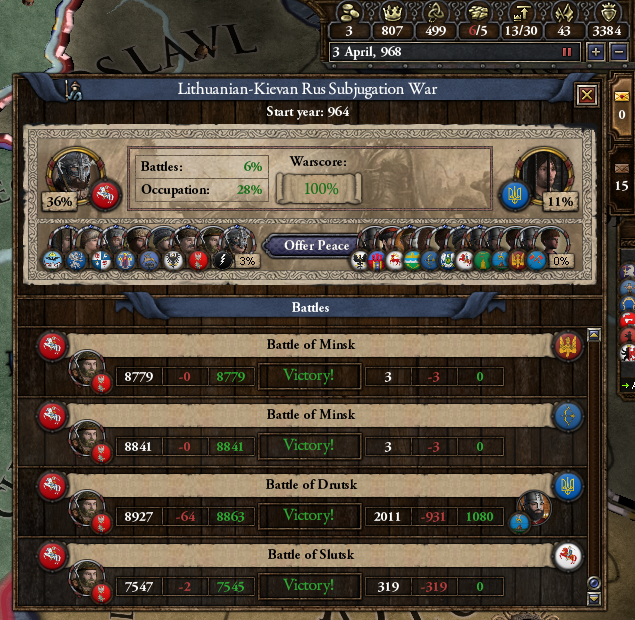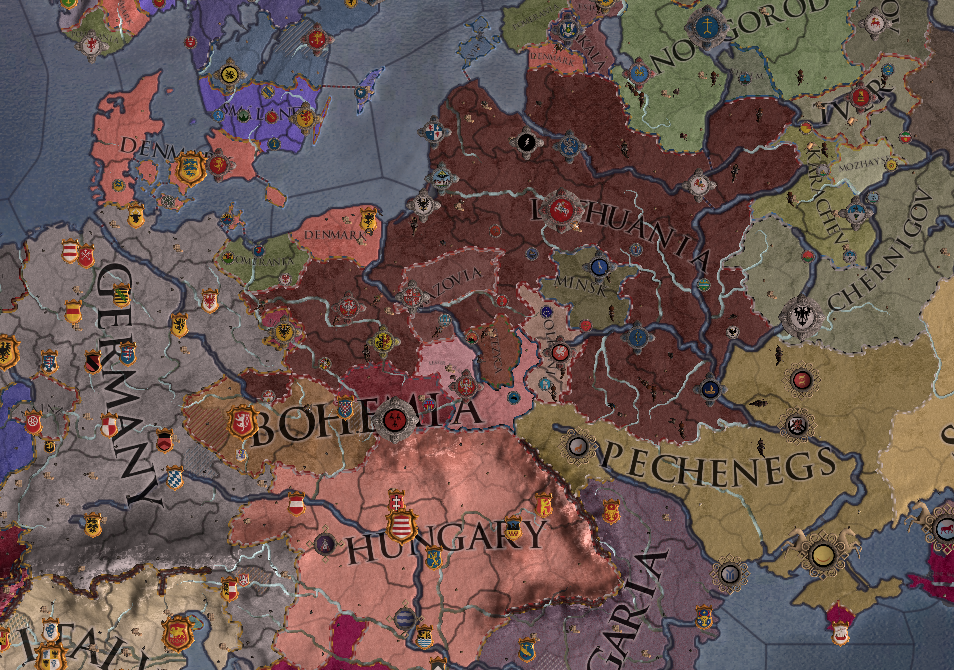Empire on Wings
Record III
The Great Dnieper War
To speak of Montvilas' reign is to speak of Lithuania's rise from one of the many powers in central and eastern Europe, to "the monster between the two seas". All of that laid upon one grand effort, one that exhausted all the resources of a young ascendant people. The Great Dnieper War.
Of course, undue importance was attached by later generations on how Montvilas the great and holy prepared for the greatest war in Lithuanian history up to that point. He was actually more concerned about spiting the chief of Latgale, who had tried to assassinate him some years previous, before getting seriously worked up for the oncoming war.
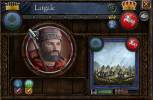
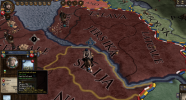
Despite the chief of Latgale holding three provinces in the four-province high chiefdom, Montvilas awarded the title of High Chief to the chief of Selija, comfortably shutting the man up in his own corner of the world, silenced.
With his petty grudge settled, Montvilas turned his hawkish gaze towards ... Rome. News about Rome too often meanders up the Dnieper into eager ears at Vilnius.

Oshin, son of Romanos Lekapenos, was deposed by another faction in the ever-shifting tides of Roman politics. In favor of...
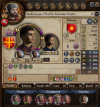
Leon VII, son of the late Konstantinos VII, who was deposed by Oshin Lekapenos.
(Total points: 3)
While this information might be of use to the Hungarians and Bulgarians, with Kievan Rus and the Pechenegs between Lithuania and Rome, there was little Lithuania could do about it. A situation Montvilas intended to change in various ways, for various reasons, through various methods. War with Kiev was at the very bottom of the to-do list.
The king planned to party some more. And the thing about alcohol and people not thinking straight is, this crazy plan worked. Former enemies were placated and brought together. Some vassals became so much more.
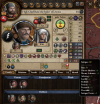
Livonia, which Kernius went so far as to call "the scar of Lithuania", finally had a lord willing to cooperate with Vilnius. No, cooperate is too light a term: to turn from enemies into the most reliable of allies. True friends. Under the influence of alcohol and honest conversation, the old spider of Livonia made peace with the young lion of Lithuania. As could be expected, old man Baise became Montvilas' spymaster.
For four years the king prepared his realm for the Great Dnieper War, worried about the prospects of its Slavic chiefs joining Kiev if the frontlines collapsed. These worries proved to be decisive in making the king take a more cautious approach throughout the war - and thus, able to salvage his greatest mistakes.
(There is actually no in-game mechanic for your vassal chiefs to defect to their co-religionists. However, narratively speaking, such a concern, such a risk, is most certainly not unfounded.)

January 31st, Anno Domini 964. The day the Great Dnieper War started, and thus one of the most important dates in central European history.
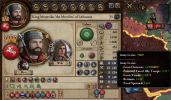
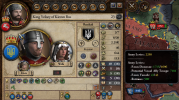
To those with only a cursory knowledge of the war, Lithuania held an enormous advantage, and should not have struggled as much as it did. However, slight digging reveals substantial Russian and Polish chiefs that chose not to fight the Kievan Rus, either out of common identity or because they just hate the worshippers of Dievas that much. Lithuania's advantage laid in its monster of an overall commander, not numbers.
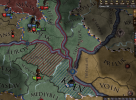
The war's first year was surprisingly uneventful. The sheer bulk of the Kievan Rus meant they had to recall troops from various directions to counter another invasion, which happened in the middle of Svjpod's invasion of their northern coastal exclaves, while the more geographically compact Lithuanian army quickly mustered and struck along the Dnieper.
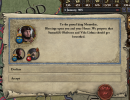
As if some camaraderie is shared between the two powers ripping at Kievan Rus together, the king of Svjpod proposed a betrothal between his prince and the kynaz's niece in the middle of both our wars against the Kievans. The gesture was appreciated, and the betrothal was sealed.
Alas. Though the battlefield was uneventful, the home front was not. Tragically eventful.
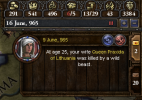
The kynaz's second wife and his lover, Queen Praxida of Lithuania, High Chieftess of Minsk, reigning in Novgorodek, lost her life in a freak accident involving wild beasts. Though a Ruswoman from the Minsk area by birth, Praxida was raised at old Kernius' court and spoke better Lithuanian than Rus language. Having known each other since her early days, Montvilas was one of Praxida's tutors. Despite his brother being her captor, a bonding still occurred between the two, though wary of his brother's wrath, Montvilas did not dare separate himself from Praxida's mother, who was also his first wife by decree of Kernius, and only kept the young girl as his concubine. After her mother's natural death, Montvilas and Praxida finally married, the young king making a point of opening Kernius' "treasure hoards for food" to share his happiness.
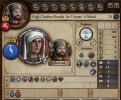
The entire affair was made even more tragic when the king learned his queen died while pregnant. Many blame the king's irrational obsession of protecting Vilnius on the early death of Praxida, and the emotional scars that messy affair left Montvilas with. Indeed, if he was thinking straight, the First Battle of Vilnius may not have proved the turning point of the Great War.
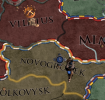
Brushing aside the warnings of his generals, the kynaz made a beeline for Vilnius through Novogrodek, now held by Praxida's eldest sister after her untimely death, willing to risk the river to get to Praxida's children before the Rus breach the walls of Vilnius.
Alas, a river is a river, and it does not give a damn about your flowing heartbreaks. Tired from the hasty river crossing and spotted by Rus scouts patrolling nearby, the First Battle of Vilnius was a resounding defeat for the ill-prepared Lithuanians. For the first time in his life, Montvilas tasted defeat in the air. After one and a half year of war leading up to 1st Vilnius, the kynaz found himself unable to withstand the Kievan host, who was calling for support even from the flanks of the Lithuanian kingdom itself, where small chiefdoms like Mazovia and Silesia run rampant on its southern lands.
There was little he could do except empty the treasury and keep the war going with mercenaries. However, Lombards and Cumans and Pechenegs had none of the motivation of the Lithuanians and Lettigalians and Pruthenians when it comes to fighting in the forests and plains of the north. It was said in the third year, Montvilas grew as despondent as his hired army, suffering even more setbacks, coming on the verge of total defeat after losing the 2nd March on Kiev and 3rd Vilnius.
However, by the third year, his efforts to keep the war out of the traditional Lithuanian heartlands paid off. While Vilnius sits upon the frontlines and for this reason was attacked again and again, life was largely peaceful in the rest of Lithuania proper. Taking breaks from their monotone life in peace, the people heard tales about Montvilas their king - the love story shared with Praxida, her tragic early death, his first heroic strikes into the heart of darkness, the tragic downturn borne out of his love for the children of his beloved and his faltering war against the nightmare of the Romuva: all of that was spun together by the wandering priests of the gods, and this newest addition to the epics of Lithuania moved listeners to tears. And by the thousands they flocked to the banner of their brooding, despairing kynaz.
The war turned once again at Vilnius. Indeed, 4th Vilnius was a battle that deserves all the attention it gets in Lithuanian history.
One could comfortably claim that, as a people, when did the lines between Lithuanian, Lettigalian and Pruthenian blur, forming one Lithuanian identity? 4th Vilnius.
Tactically speaking, though, 4th Vilnius was no miracle - horse archers were simply the bane of infantry on plains, while spirited but poorly trained pikemen made sure the Kievan cavalry could not be spared to chase away the horse archers. If he was truly, invisibly wounded by so many reminders of his beloved's death, Montvilas' composure did not show, did not break, as befitting a king. His command performance was as good as usual.
In later mythologizing of 4th Vilnius, storytellers claim Praxida's voice brought him to an unprecedented level of tactical genius.
After 4th Vilnius shattered the last of the Kievan host, the Lithuanians went on a rampage into Rusland, seeking to repay the destruction wrought be the 4 Battles of Vilnius tenfold. They even missed the king of the Kievans they accidently captured while marching from Drutsk to Slutsk, who was leading his huscarls while leaving overall command to one of his generals.
The war soon came to a close when the kynaz himself was notified of the enemy king's presence amongst his captives. After four years of tragedy and darkness and bloodshed, Lithuania has stepped out of its own nightmare at last.
With the corpse of its nightmare in hand.
Central and Eastern Europe just after the Great Dnieper War. Montvilas would soon conquer the High Chiefdom of Minsk for Praxida's son.
 (However, health traits are disregarded)
(However, health traits are disregarded)